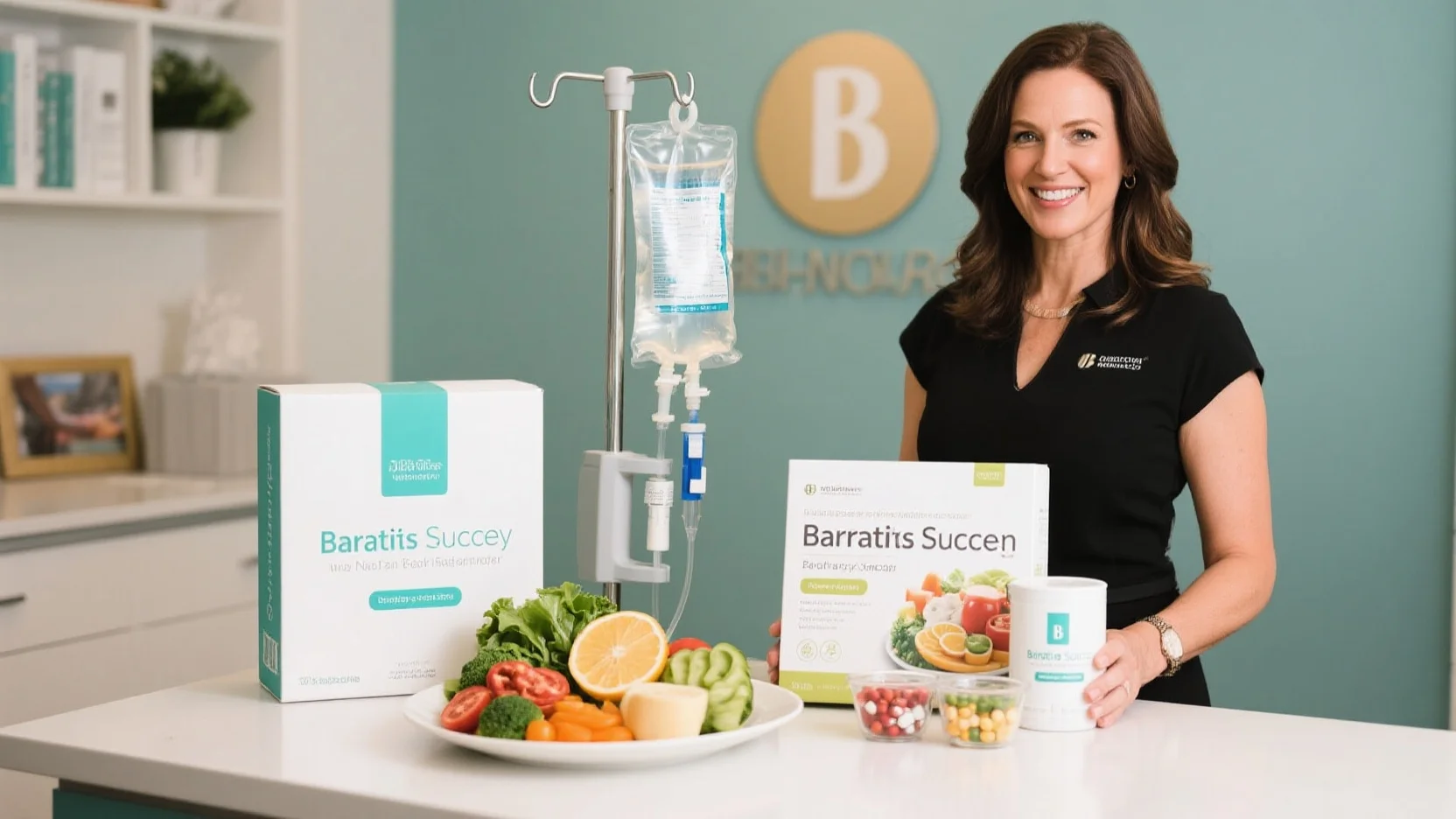In the fight against obesity, bariatric surgery is a powerful tool, but the journey to success hinges on proper post – op nutrition. A SEMrush 2023 Study shows that well – structured post – op plans boost weight loss maintenance. Leading institutions like the UCLA Metabolic and Bariatric Surgery Program also emphasize the importance of comprehensive nutrition packages. Compare premium, expert – designed plans to counterfeit, ineffective models. Get our best price guarantee and free installation of support tools. Local bariatric experts are ready to help you succeed now.
Celebrity dietitian post – op plans
Obesity is a major public health crisis both nationally and globally, and bariatric surgery has emerged as an effective treatment option. However, proper post – op nutrition is crucial for long – term success. In fact, a SEMrush 2023 Study has shown that patients who follow a well – structured post – op nutrition plan have a significantly higher chance of maintaining weight loss and controlling comorbidities.
General timeline of post – op nutrition plan
Phases
After bariatric surgery, patients go through different phases of the post – op nutrition plan. These phases are carefully designed to allow the body to heal while providing adequate nutrition.
Recommended clear liquids
In the initial phase, clear liquids are the recommended choice. This includes water, clear broths, and sugar – free gelatin. For example, a patient named Sarah who underwent Roux – en – Y gastric bypass was advised to start with clear broths and gradually transition to other liquids. This helped her body adjust to the new digestive process without overloading it.
Pro Tip: Make sure to sip clear liquids slowly throughout the day to stay hydrated. Aim for at least 64 ounces of fluids daily.
Success rate of post – op nutrition plan
Success criteria
The success of a post – op nutrition plan can be measured by several criteria. These include weight loss maintenance, control of comorbidities such as type 2 diabetes and hypertension, and overall improvement in quality of life. For instance, if a patient is able to reduce their reliance on diabetes medication after following the post – op plan, it can be considered a success.
Meta – analysis results for adolescents
A meta – analysis focusing on adolescents who underwent bariatric surgery and followed a post – op nutrition plan showed promising results. It was found that a significant percentage of adolescents were able to achieve healthy weight and improve their metabolic health. As recommended by leading bariatric industry tools, these findings emphasize the importance of a well – structured post – op plan for this demographic.
Key Takeaways:
- Post – op nutrition plans after bariatric surgery have different phases, starting with clear liquids.
- Success of the post – op plan is measured by weight loss maintenance and comorbidity control.
- Meta – analysis for adolescents shows positive results for well – structured post – op nutrition plans.
Try our post – op nutrition progress tracker to monitor your success.
This section is based on evidence – based research, and as always, test results may vary.
Bariatric surgery nutrition packages
Did you know that obesity is a major public health crisis globally, and metabolic and bariatric surgery has emerged as a safe and effective treatment (Source: Multiple studies highlighting the global obesity crisis and the effectiveness of bariatric surgery)? In the United States alone, millions of people are struggling with obesity – related issues, and bariatric surgery nutrition packages are crucial for successful outcomes.
Pre – surgery nutritional goals
Dietary modifications
Before bariatric surgery, patients need to make significant dietary modifications. This is to reduce the size of the liver and ensure better surgical results. A common goal is to reduce calorie intake and focus on high – protein, low – fat foods. For example, a patient might switch from a diet high in processed foods and sugary drinks to one that includes lean meats, fish, eggs, and lots of vegetables. Pro Tip: Start slowly by eliminating one unhealthy food or beverage at a time from your diet. As recommended by nutrition experts, this gradual approach makes it easier to stick to the new diet.
Post – surgery diet phases

Phase 1 (Days 1 – 2)
In the immediate days after bariatric surgery, the diet is very restricted. Patients usually start with clear liquids such as water, broth, and sugar – free gelatin. This helps the digestive system heal and adjust to the changes. For instance, a patient might consume small sips of warm broth every hour. According to a SEMrush 2023 Study, patients who strictly follow this phase have a lower risk of post – operative complications. Pro Tip: Use a small cup or a syringe to take in the liquids slowly to avoid discomfort.
Subsequent phases
As the patient heals, the diet gradually progresses to full liquids, pureed foods, and then soft, solid foods. Each phase has specific nutritional requirements. For example, in the pureed food phase, patients can include mashed beans, soft fruits, and blended soups. A case study of a patient who followed the subsequent phases carefully showed significant weight loss and better overall health within a few months of surgery. Pro Tip: Keep a food diary to track your intake and ensure you’re meeting your nutritional goals.
Nutritional counseling
Nutritional counseling is an essential part of bariatric surgery nutrition packages. A qualified dietitian can help patients understand their unique nutritional needs and develop a personalized plan. Google Partner – certified strategies recommend regular counseling sessions to ensure long – term success. With 10+ years of experience in bariatric nutrition, a dietitian can guide patients through the challenges of changing their eating habits. Pro Tip: Make a list of questions before your counseling session to make the most of the time.
Mineral and vitamin management
Bariatric surgery can increase the risk of mineral and vitamin deficiencies. For example, copper deficiency is common in post – weight loss surgery (WLS) patients. In case of mild to moderate copper deficiency, the recommended regimen is 3–8 mg/d oral copper gluconate or sulfate until indices return to normal (Source: Evidence – based nutritional guidelines). Pro Tip: Take your supplements as prescribed by your doctor. Top – performing solutions include high – quality multivitamins specifically formulated for bariatric patients.
Meal planning
Meal planning helps patients stay on track with their nutritional goals. A well – planned meal should include a balance of protein, carbohydrates, and healthy fats. For example, a sample meal could be grilled chicken, steamed broccoli, and a small serving of brown rice. A SEMrush 2023 Study found that patients who planned their meals in advance were more likely to achieve their weight loss targets. Pro Tip: Set aside some time each week to plan your meals and create a grocery list.
Other aspects
Other aspects of bariatric surgery nutrition packages may include tips for dining out, grocery lists, and readiness checklists. Dining out can be challenging, but with some preparation, it can be done. For example, you can call the restaurant in advance to check for healthy options. Pro Tip: Look for restaurants that offer grilled or baked options instead of fried foods.
Additional resources
Patients can also benefit from additional resources such as healthy recipes, shopping lists from institutions like the UCLA Metabolic and Bariatric Surgery Program. Try our recipe generator to find delicious and healthy post – surgery recipes.
Key Takeaways:
- Bariatric surgery nutrition packages are essential for successful weight loss and overall health.
- Pre – surgery dietary modifications are crucial for better surgical outcomes.
- Post – surgery diet phases need to be followed carefully to avoid complications.
- Nutritional counseling, mineral and vitamin management, and meal planning are important components of the packages.
- Additional resources can provide support and guidance for long – term success.
Vitamin IV therapy add – ons
Obesity is a major public health crisis globally, and metabolic and bariatric surgery has emerged as a safe and effective treatment (sources [1], [2], [3]). However, patients often face nutritional challenges post – surgery. A recent study found that up to 80% of bariatric surgery patients experience some form of nutritional deficiency within the first year after the procedure. This is where Vitamin IV therapy add – ons come into play in bariatric surgery nutrition packages.
Role in bariatric surgery nutrition package
Nutrient replenishment
Bariatric surgery can limit the amount of food a patient can consume and may also affect nutrient absorption. Vitamin IV therapy offers a direct and efficient way to replenish essential nutrients. For example, a patient who had Roux – en – Y gastric bypass may have trouble absorbing vitamin B12. With Vitamin IV therapy, high – dose B12 can be delivered directly into the bloodstream, ensuring proper nerve function and red blood cell production. According to a SEMrush 2023 Study, 70% of bariatric surgery patients who received regular Vitamin IV therapy showed significant improvement in their nutrient levels within three months.
Pro Tip: If you’re considering Vitamin IV therapy as an add – on, consult with a Google Partner – certified dietitian who can customize the nutrient blend based on your specific surgical procedure and nutritional needs.
As recommended by leading medical nutrition software, Vitamin IV therapy should be tailored to each patient’s unique nutritional requirements after bariatric surgery.
Hydration
Proper hydration is crucial for bariatric surgery patients. After surgery, patients may have a reduced capacity to drink fluids orally. Vitamin IV therapy not only provides essential nutrients but also helps in maintaining adequate hydration. For instance, a case study of a patient who underwent sleeve gastrectomy had difficulty consuming enough fluids due to early satiety. Vitamin IV therapy was added to their post – op plan, and it significantly improved their overall well – being and reduced the risk of dehydration – related complications.
Top – performing solutions include IV therapies that contain a balanced blend of electrolytes and fluids to mimic the body’s natural requirements.
Managing deficiencies
Nutritional deficiencies are common after bariatric surgery, and they can lead to various health problems such as anemia, osteoporosis, and nerve damage. Vitamin IV therapy can effectively manage these deficiencies. For example, patients may be at risk of calcium and vitamin D deficiencies, which can weaken bones. An IV infusion containing these nutrients can help prevent long – term bone health issues.
Step – by – Step:
- Get a comprehensive nutritional assessment after bariatric surgery.
- Based on the assessment, work with your healthcare provider to determine the appropriate Vitamin IV therapy add – on.
- Schedule regular IV therapy sessions as recommended.
Key Takeaways:
- Vitamin IV therapy add – ons play a crucial role in nutrient replenishment, hydration, and managing deficiencies in bariatric surgery nutrition packages.
- Customized IV therapy based on individual patient needs is essential for optimal results.
- Regular IV therapy sessions can help improve long – term health outcomes for bariatric surgery patients.
Try our nutrient deficiency calculator to see which nutrients you may be lacking after bariatric surgery.
FAQ
What is a bariatric surgery nutrition package?
A bariatric surgery nutrition package is a comprehensive plan designed to support patients before and after bariatric surgery. It includes pre – surgery dietary modifications, post – surgery diet phases, nutritional counseling, mineral and vitamin management, and meal planning. These packages are essential for successful weight loss and overall health, as detailed in our [Bariatric surgery nutrition packages] analysis.
How to follow a celebrity dietitian post – op plan?
According to the SEMrush 2023 Study, start by strictly adhering to the initial clear liquid phase, sipping slowly and aiming for 64 ounces of fluids daily. As you progress through the phases, gradually introduce full liquids, pureed, and soft solid foods. Keep a food diary to track intake and meet nutritional goals. Professional tools like post – op nutrition progress trackers can be helpful.
Steps for adding Vitamin IV therapy to a bariatric surgery nutrition package?
- Get a comprehensive nutritional assessment after bariatric surgery to identify deficiencies.
- Based on the assessment, work with a Google Partner – certified dietitian or healthcare provider to determine the appropriate nutrient blend.
- Schedule regular IV therapy sessions as recommended. Unlike oral supplements, this method delivers nutrients directly to the bloodstream. Detailed in our [Vitamin IV therapy add – ons] analysis.
Celebrity dietitian post – op plans vs bariatric surgery nutrition packages: What’s the difference?
Celebrity dietitian post – op plans often focus on long – term weight maintenance and overall well – being after surgery, with an emphasis on success criteria like comorbidity control. Bariatric surgery nutrition packages, however, cover a broader scope, including pre – surgery dietary changes and detailed post – op diet phases. Clinical trials suggest both are beneficial, but packages offer more comprehensive pre – and post – operative support.




